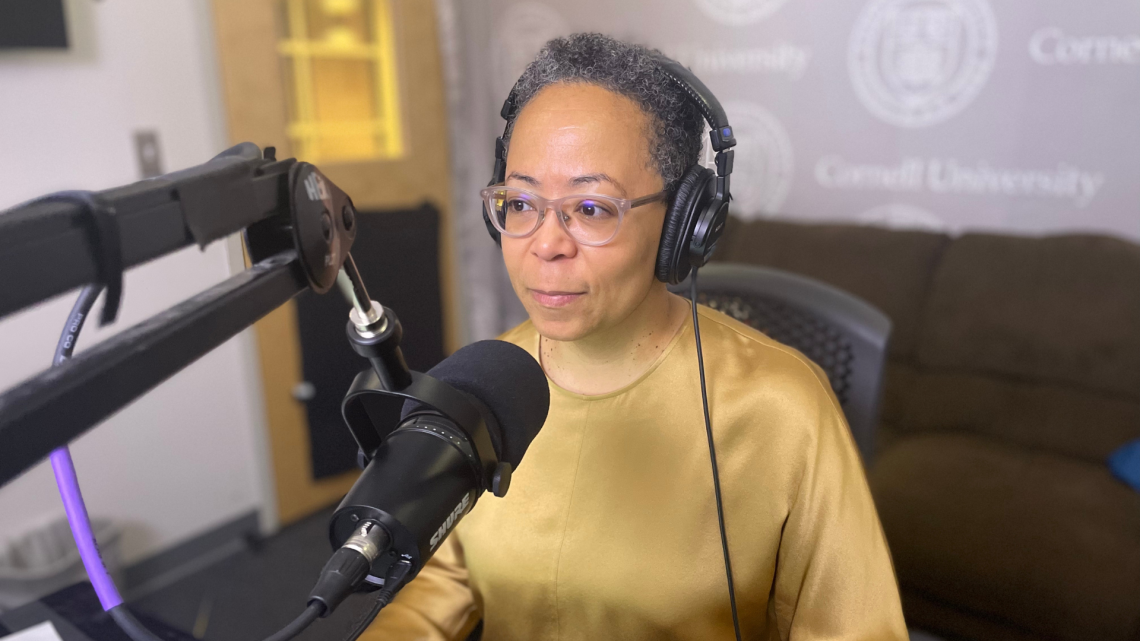
News directly from Cornell's colleges and centers
The Inclusive Excellence Podcast: A Librarian's Lens on Today's Library
By Grace DePaull
In this episode of the Inclusive Excellence Podcast, Erin Sember-Chase and Toral Patel sit down with the Carl A. Kroch University Librarian at Cornell for a conversation about the critical role that libraries play in preserving the past, especially when it comes to censorship, the rise of banned books and this year’s theme – freedom of expression.
Elaine Westbrooks first arrived at Cornell in 2000. Fresh out of library school, she secured a position at Mann Library as a metadata librarian for six and a half years before leaving Ithaca to pursue experiences at other universities. After working at the University of Nebraska, the University of Michigan and the University of North Carolina at Chapel Hill, Westbrooks found herself back at Cornell, this time as the university librarian and chief academic and administration officer of the library and press.
“I'd been wandering around for fifteen years,” Westbrooks said. “And then, of course, Cornell lured me back to Ithaca. As we all know, Cornell is a really special place, and I don't think any other place could have lured me back other than this university.”
Since her return, Westbrooks has focused on uncovering and highlighting narratives previously erased from historical records. The preservation of diverse perspectives is something she has dedicated herself to helping improve. Westbrooks shares how libraries at Cornell are engaging in deliberate care when assessing archival materials. They focus on enriching descriptions that will invite more people into a collection instead of relying on terminology and historical portrayals that are exclusionary.
“We are not rewriting history,” Westbrooks said. “We are not changing what people have said or what they have done. We are merely adding more descriptive information so that the erasure of Black bodies, women and Queer people are seen. Through our work, we empower people to imagine a more just and equitable world focused on knowledge, mutual care, learning and humanity. I think that’s why I love libraries because we have a very big vision for who we are and what we do.”
Westbrooks dives into the history of libraries in the United States and explains how their past is deeply intertwined with this year’s theme of freedom of expression.
“Free expression is a fundamental core belief that is critical to libraries,” Westbrooks said. “The library has a responsibility to collect and show all the complexities of humanity and all the complexities of our historical record. That is something that I think all libraries take seriously, and I certainly take it seriously as the university librarian.”
Westbrooks also shares how the library is committed to the academic success and life-long learning of Cornellians and how she ensures that libraries across campus are accessible and inclusive spaces.
“Cornell University Library should be a library that leads and that our peers should look to us for guidance, innovation and expertise,” Westbrooks said. “We make a promise to Cornellians today and tomorrow that we are going to preserve the history of this great university. We make a promise that we are going to help our researchers push the frontiers of knowledge. And we make a promise that students belong. When our students come into the library, we reinforce that belonging, and I'm here to make sure that we continually focus on that promise and that we have the integrity to fulfill that promise.”
Tune in to hear more about Elaine Westbrooks’s journey and the evolution of libraries in Episode 74: A Librarian’s Lens on Today’s Library. Visit https://diversity.cornell.edu/iepodcast to access the episode and transcript.
Media Contact
Get Cornell news delivered right to your inbox.
Subscribe